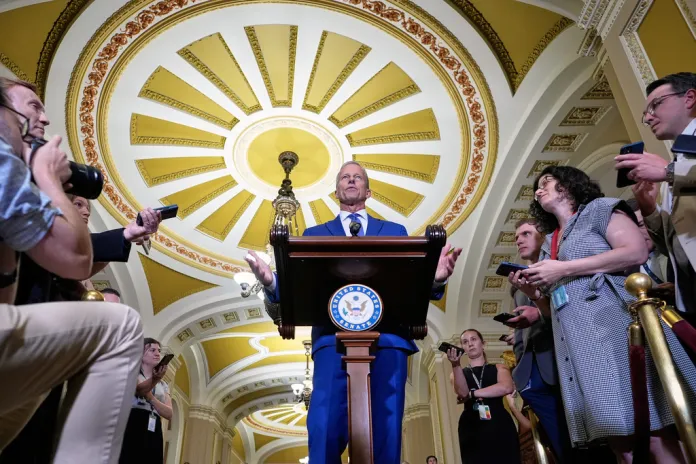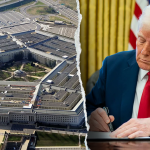Senate Republicans returned to Washington Tuesday from summer break, facing warnings from within that the White House’s clawback of spending passed by Congress could jeopardize a fast-approaching shutdown deadline.
GOP critics of President Donald Trump’s nearly $5 billion “pocket” rescission for foreign aid said the controversial move, which some have suggested may flout the law, would do them no favors in winning over enough Democrats later this month to fund the government by Oct. 1.
The words of caution extended beyond the GOP’s usual centrist detractors, such as Sens. Susan Collins (R-ME) and Lisa Murkowski (R-AK), foreshadowing what is likely to be a messy showdown with Democrats in the upper chamber over the coming weeks.
“Anything that gives our Democrat colleagues a reason not to do the bipartisan appropriations process is not a good thing,” Sen. Mike Rounds (R-SD) said. “And if they can use that as an excuse, that causes us a problem.”
Sen. Shelley Moore Capito (R-WV), a leadership member, said her “preferable route” to cancel previously appropriated funds would be through the standard annual budget process.
Senate Majority Leader John Thune (R-SD) predicted the legality of pocket rescissions, not used since 1977, will “be tested and litigated in courts.” He reassured Democrats that GOP leadership remained committed to ongoing budget negotiations.
“I think [Democrats] may try and use that as an excuse for not working in a bipartisan way on appropriations, but that’s all it’ll be: an excuse,” Thune told reporters. “They know that I’m committed, Senator Collins is committed, our conference is committed to working constructively to try and fund the government through the normal appropriations process.”
Appropriators are working behind the scenes to craft a yearlong bipartisan spending plan but are likely to need another stopgap funding measure to avoid a shutdown, which will require at least seven Democrats to cross the aisle and break a 60-vote filibuster. Some Democrats say Trump’s pocket rescission, a legally untested maneuver under the Impoundment Control Act that allows presidents in certain cases to withdraw funds without lawmakers’ approval, underscores the need to bolster their resistance to the administration.
Sen. Cory Booker (D-NJ), a Democratic leadership member with potential 2028 presidential aspirations, previewed the blunt message he was advocating to his progressive colleagues: “It’s time to fight.”
“This is a time to draw a line. I am not giving my vote away to Donald Trump on a budget that’s going to hurt people, on a budget that’s going to take away healthcare, on a budget that’s going to hurt families who are really struggling,” Booker said. “I’m telling folks this is a crossroads.”
Republican leaders expect the rescission, announced last week by the White House budget office, to be ultimately settled by the courts and is already the subject of ongoing litigation. The administration’s legal justification last week was that the money, $3.2 billion for the U.S. Agency for International Development and $1.7 billion for State Department programs, was for “wasteful foreign assistance programs” and international groups that “do not support major U.S. policies or priorities or have been operating contrary to American interests for many years.”

A separate rescission from Trump earlier this year required the approval of Congress, which both GOP-led chambers supported. But without buy-in this go-around and so close to a funding cliff, the heartburn is palpable among even Republican appropriators.
Collins, chairwoman of the Appropriations panel facing a battleground reelection next year, has criticized the rescission as a “clear violation of the law.”
TRUMP’S $4.9 BILLION ‘POCKET’ RESCISSION PLAY HEIGHTENS SHUTDOWN DRAMA IN CONGRESS
Murkowski, another centrist and frequent critic of the president who sits on the Appropriations Committee, doubled down Tuesday in her belief that the White House was unlawfully attempting to further flout Congress’s authority.
“Unfortunately, we don’t have a lot of tools, do we?” Murkowski said. “In terms of, is there something legislatively we can do, that’s the challenge. There are a lot of political paths.”
David Sivak contributed to this report.























